Tyrosine kinases (TKs) are enzymes that catalyze the phosphorylation of tyrosine residues in proteins, playing a critical role in cellular processes such as growth, proliferation, differentiation, and apoptosis.
Tyrosine kinases are classified into two categories: receptor tyrosine kinases (RTKs) and non-receptor tyrosine kinases (NRTKs). Receptor tyrosine kinases include families such as EGFR, HER2, VEGFR, and FGFR, which are key targets in the initiation, progression, and metastasis of tumors. For example, EGFR mutations are common in non-small cell lung cancer, while HER2 overexpression is closely associated with breast cancer. Non-receptor tyrosine kinases, such as BTK (Bruton's tyrosine kinase), play a significant role in hematologic malignancies like chronic lymphocytic leukemia.
Among the 82 small-molecule protein kinase inhibitors approved by the U.S. FDA, 41 target receptor tyrosine kinases, and 21 target non-receptor tyrosine kinases. This demonstrates the critical importance of tyrosine kinase inhibitors in the field of kinase drug development.
During the development of kinase inhibitors, kinase activity evaluation is the most essential testing step, which can be broadly divided into two types of assays:
1. Measuring the generation of phosphorylated substrates (e.g., Revvity’s HTRF® KinEASE™ Assay and LANCE® Ultra Kinase Assay).
2. Detecting ADP production during the kinase reaction (e.g., Promega’s ADP-Glo™ Kinase Assay).
Among these, the TR-FRET-based detection of phosphorylated substrates offers high sensitivity and specificity while being operationally convenient and providing stable signals. It has become the "gold standard" for kinase activity assays.
VKEY-BIO has launched another innovative product based on time-resolved fluorescence resonance energy transfer (TR-FRET) technology: the KeyTec® TR-FRET TKs Kinase Kit, designed to support research and applications in biomedical fields. Below are the fundamental principles and assay steps:
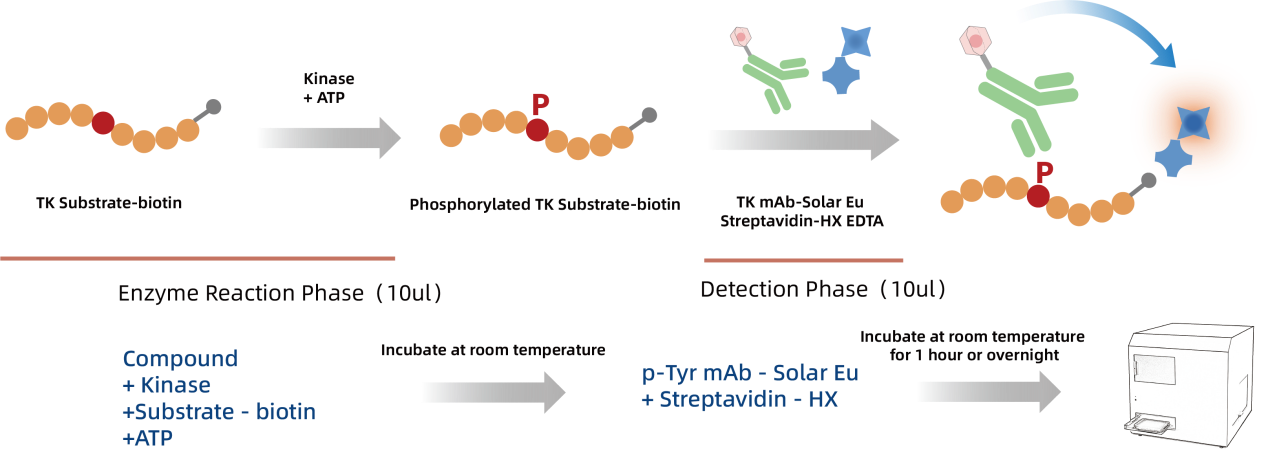
KeyTec® TR-FRET TKs Kinase Kit Principle
Step 1: Enzyme Reaction Phase
In a buffer system containing the target kinase and ATP, the kinase phosphorylates the specific substrate.
Step 2: Detection Phase
After adding EDTA (to terminate the reaction), a phospho-specific antibody and Streptavidin-HX are introduced to detect phosphorylated substrate levels. The antibody binds to the phosphorylated substrate, while Streptavidin-HX binds to the biotinylated substrate. The TR-FRET signal intensity is proportional to the amount of phosphorylated substrate generated.
1. High Sensitivity and Stability: The KeyTec® TR-FRET technology offers superior sensitivity and stability, detecting tyrosine kinase activity at levels as low as nanomolar concentrations.
2. Broad Applicability: Supports activity assays for over 60 tyrosine kinases, making it versatile for various assay needs.
3. Diverse Substrate Options: In addition to universal substrates, it provides BTK/JAK/FGFR-specific substrates to meet diverse customer demands and customization requirements.
4. Simple and Fast: The kit features straightforward protocols, enabling researchers to obtain reliable data quickly, ideal for high-throughput screening.
Validation Data Examples (EGFR/JAK1/BTK)
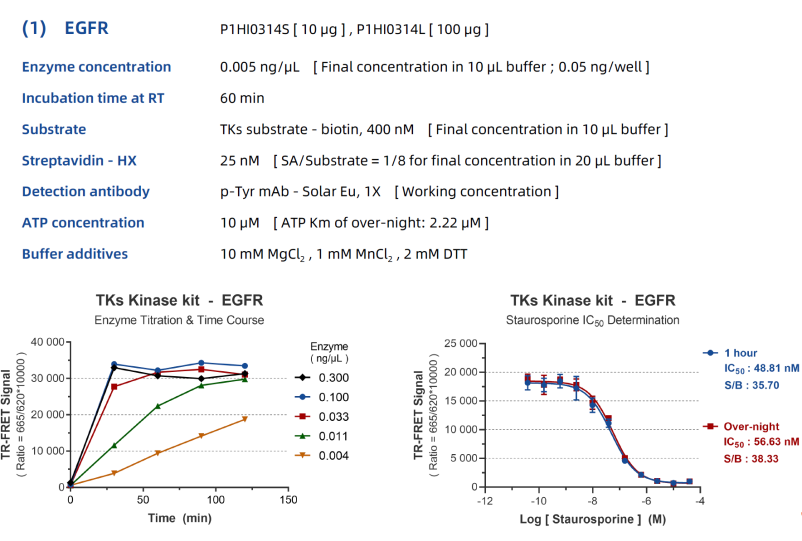
EGFR validation data
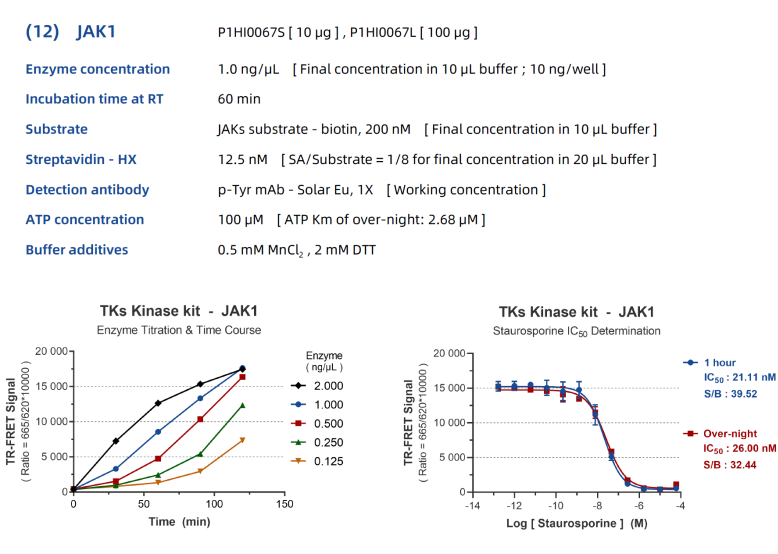
JAK1 validation data
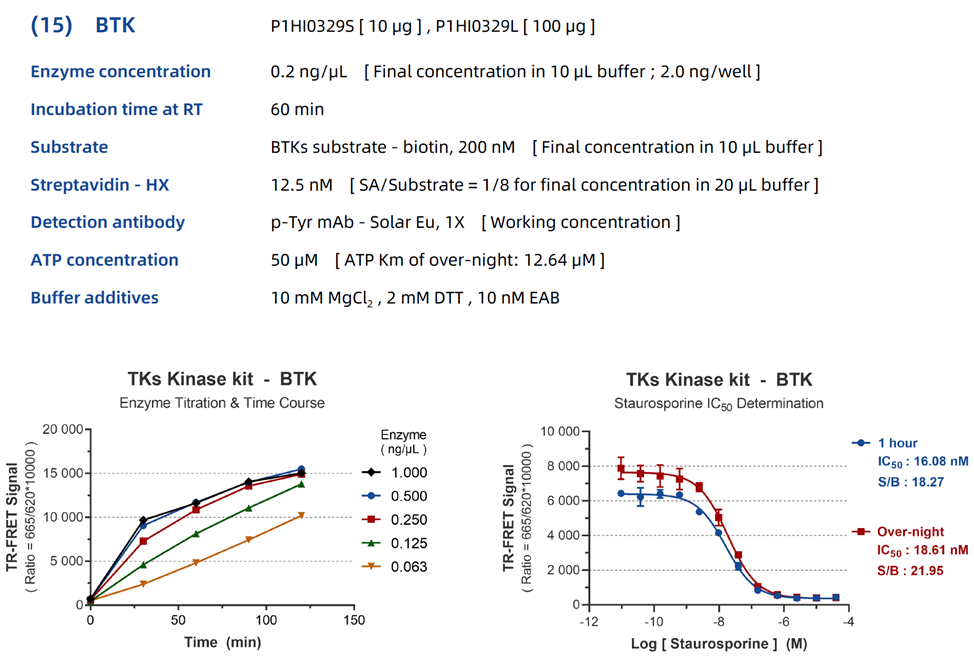
BTK validation data
The KeyTec® TR-FRET Kit demonstrates excellent sensitivity and specificity in detecting the activity of kinases such as EGFR, JAK, and BTK, providing reliable data support for related research.

Substrates Required for Use with KeyTec® TR-FRET TKs Kinase Kit:
KeyTec® TR-FRET TKs kinase kit Substrate | Application |
KeyTec® TR-FRET TKs substrate - biotin | Universal TK kinase substrate: Can cover approximately 80% of tyrosine kinases |
KeyTec® TR-FRET BTKs substrate - biotin | BTK, BTK [C481R], BTK [C481S] |
KeyTec® TR-FRET JAKs substrate - biotin | JAK1, JAK2, JAK3 |
KeyTec® TR-FRET FGFRs substrate - biotin | FGFR1,FGFR2.FGFR3, FGFR4 |
Related Substrate Product List:
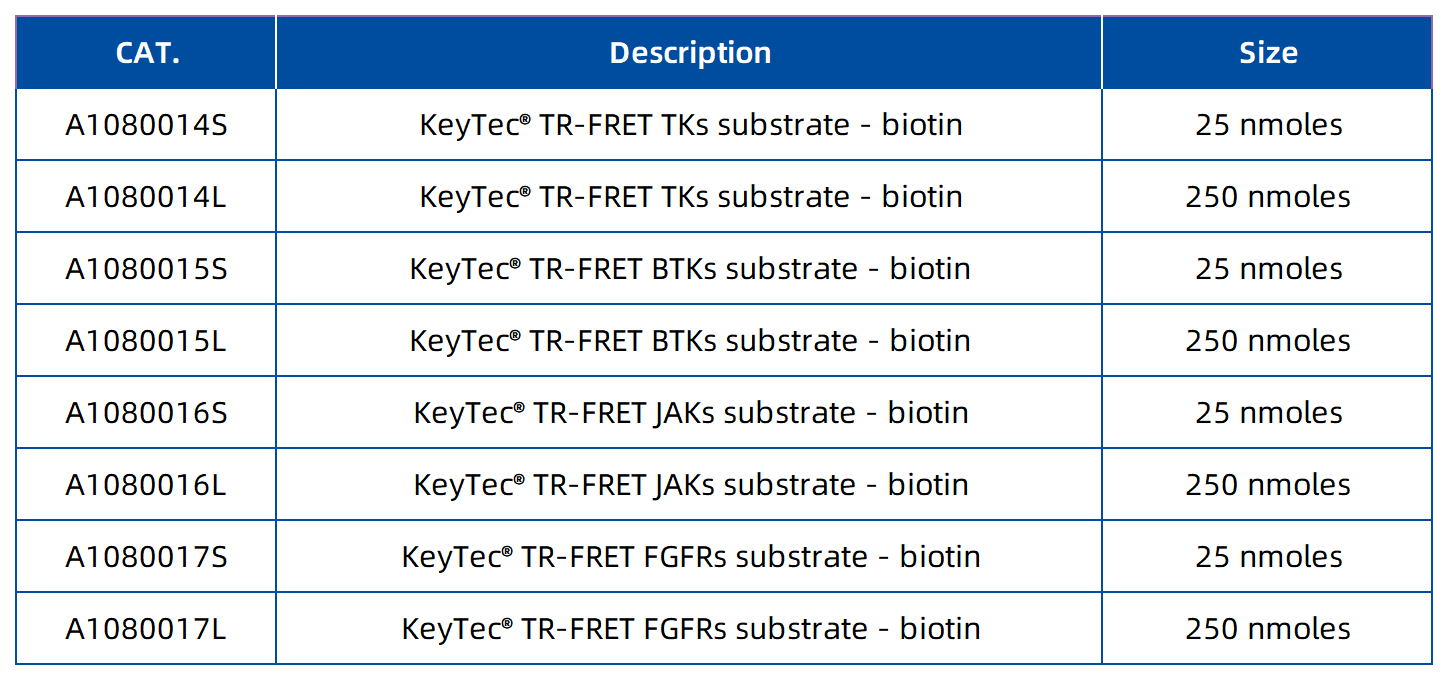
Additionally, all kinase products from VKEY-BIO come with validated activity data. For more information, visit the official website: http://www.vkeybio.com. You can also contact sales representatives by entering the keyword "Purchase" on VKEY-BIO’s official WeChat account.
The KeyTec® TR-FRET Tyrosine Kinase Activity Assay Kit provides an efficient and reliable tool for life science research, particularly in oncology studies and drug development. Its high sensitivity and specificity make it an ideal choice for tyrosine kinase activity detection. Compared to competing products, KeyTec® TR-FRET not only outperforms in performance but is also simpler to operate, making it suitable for researchers of all levels.
We believe that as scientific research advances, this product will empower more researchers and companies, driving progress in related fields. With the KeyTec® TR-FRET Tyrosine Kinase Activity Assay Kit, you can delve deeper into the mysteries of tyrosine kinases, paving new paths for future scientific research and drug development.